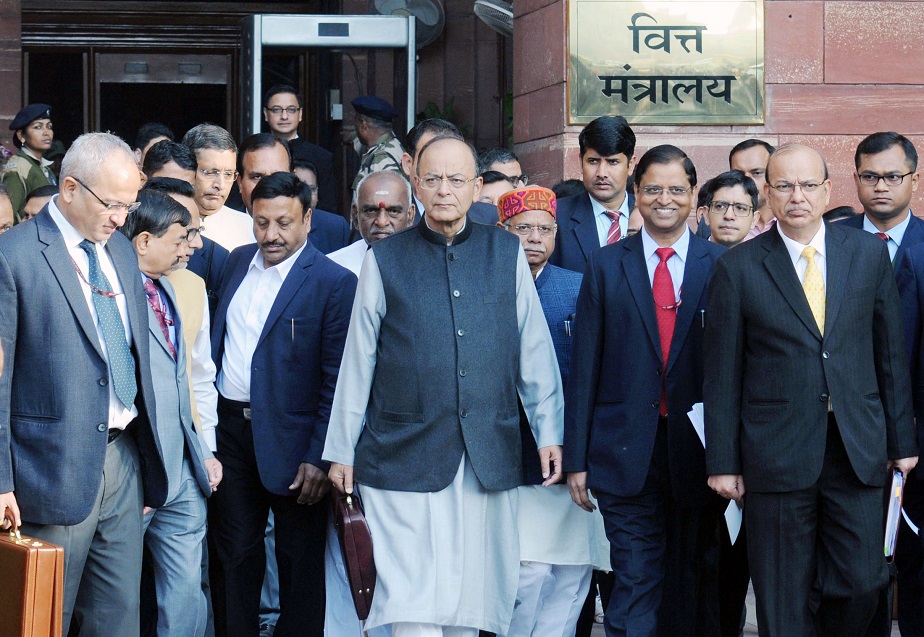
Industry welcomes the ‘balanced Budget’
Aamir H Kaki
Industry players have welcomed and appreciated the Union Budget 2018-19 and called it a balancing act aimed at inclusive growth for boosting the country’s economy.
Focused on strengthening agriculture, rural economy, infrastructure, MSME and exports, the Budget for fiscal 2018-19 was presented by Finance Minister Arun Jaitley on Thursday.
Welcoming the Budget, Federation of Indian Export Organisation (FIEO) said that it’s a balanced Budget for the country aiming at inclusive growth and transforming rural India.
FIEO President Ganesh Kumar Gupta said that the target to take agri-exports from $30 billion to $100 billion is very encouraging as agri-exports would be instrumental in doubling farmers’ income. A stable Agri Export Policy based on digitalised current stock position, scientific forecasting of crop prospects, current demand would help in devising such a policy.
“However, the backward and forward linkages in agriculture through logistics and supply chain would be required to meet such targets. The state-of-art facility in 42 mega food parks will unleash the potential of food processing exports,” he said.
Gupta further said that the increased allocation from Rs.1100 crore to Rs.2000 crore for the Interest Equalization Scheme (IES) for the current year and Rs.2500 crore for 2018-19 would help the export sector as it gives cushion to include merchant exporters and services exporters also for the benefit of IES.
“Similarly, enhanced allocation for Remission of State Levies (RoSL) from Rs.1555 crore to Rs.1855 crore for the current fiscal and Rs.2164 crore for the subsequent fiscal will not only help in clearing the backlog but could also be used to extend the benefit to carpets, handicrafts and fabrics & yarn exports,” he added.
Commenting on the Budget, ASSOCHAM President, Sandeep Jajodia said, “The budget is on expected lines and provides support to sections of the society, where it was needed the most. The agri and rural landscape were in some kind of distress and provision of over Rs.14.34 lakh crore to be spent on rural infrastructure should also add to the employment generation especially in the farm sector.”
Jajodia also said that while the Finance Minister has marginally exceeded fiscal deficit targets, but if expenditure involves a quality spending, the outcome would only help economic growth.
Giving reactions on the Budget, Electronic Industries Association of India (ELCINA) said that the Budget carries a clear message by applying majority of the country’s resources for upliftment of the poor and under privileged segments of our society. There is also a rural focus and emphasis on providing education, health and social security to all strata of citizens.
On hike in customs duty on mobile phones to 20% in the Budget with the aim to further help domestic manufacturers, Rajoo Goel, Secretary General, ELCINA said that the Finance Minister has used customs duty extensively on a number of finished goods with an eye on driving manufacturing growth and to realise the “Make in India” dream.
“While this is a welcome move and industry has been pleading for it, this is a medium-term measure and industry must respond with investments in higher value added manufacturing, technology upgradation and generate employment which is a dire need for our country,” he said.
While ELCINA welcomes the enhanced protection to some products, Goel said, “There is a need to take additional steps to promote manufacturing of ITA-1 items and their components which require huge investments and state of the art technology.”
“The Budget has not allocated any funds for ESDM sector and it is hoped that the National Policy on Electronics Version 2.0 which is under preparation would be adequately funded so that its industry promotion Schemes can be implemented successfully to attract investments,” he added.
The Federation of Indian Micro and Small & Medium Enterprises (FISME) has overall welcomed the budget for the MSME sector.
In order to improve Ease of Doing Business (EODB), the Government has extended the fixed-term contract hiring beyond apparels to all sectors. The move would allow employers to hire workers for specific projects on contract for a fixed-term.
Reacting on the same, Anil Bhardwaj, Secretary General, FISME, said, “Extending the facility of fix-term employment to all sectors is a big labour reform which will encourage MSMEs to hire and create more employment.”
“FISME has hailed the provision of allocating Rs.3794 crore to MSME sector for giving credit support, capital and interest subsidy and innovations and stated that it will help the credit hit MSME sector,” said Bhardwaj.
Cashew Export Promotion Council of India (CEPCI) also welcomed the decision of the Government to cut the import duty on raw cashew nuts from 5% to 2.5%.
Kannan, Executive Director and Secretary, CEPCI, said, “The cashew fraternity was in fact expecting the withdrawal of import duty and CEPCI had made it the first point on its strategic plan submitted to the Government. Though it is a partial relief, we still request the government to withdraw the duty fully.”
Regarding budget allocations of Rs.4 crore, Kannan said, that CEPCI had requested to increase the allocation to Rs.16 crore in tune with the grant-in aid plan allocation. Since many of the claim applications are pending and the process mechanisation and modernisation are gaining enhanced momentum among several cashew growing states, we hope that the same will be enhanced after the budget discussions.
Welcoming the optimism on GDP growth targets and measures to boost agriculture and health in the Budget, HKL Magu, Chairman, Apparel Export Promotion Council (AEPC) said that the reduction in corporate tax for SMEs with turnover upto Rs.250 crore would augur well for a vast section of our industry.
In Budget 2018-19, the textile industry got an increased allocation of Rs.7148 crore which included an increased allocation of Rs.2163.85 crore for RoSL, as against Rs.1855 crore for 2017-18.
“I hope this additional fund of Rs.308.85 crore will be sufficient to meet the backlog and increased requirement towards accommodating embedded taxes and targeted growth in exports to $20 billion,” Magu said.
“The apparel industry is a women-oriented industry and the proposed reduction in the women's contribution to EPF to 8% from the present 12% will encourage women participation in this sector further,” he added.






 to success.
to success.